
Orchestral Manoeuvres in the Dark (OMD) are an English electronic band formed in Wirral, Merseyside, in 1978. The group consists of co-founders Andy McCluskey and Paul Humphreys, along with Martin Cooper and Stuart Kershaw (drums); McCluskey has been the only constant member. Regarded as pioneers of electronic music, OMD combined an experimental, minimalist ethos with pop sensibilities, becoming key figures in the emergence of synth-pop. The band were also an early presence in the MTV-driven Second British Invasion of the US.

George Andrew McCluskey is an English singer, songwriter, musician and record producer. He is best known as the lead singer and bass guitarist of the electronic band Orchestral Manoeuvres in the Dark (OMD), which he founded alongside keyboard player Paul Humphreys in 1978; McCluskey has been the group's sole constant member. He has sold over 40 million records with OMD, and is regarded as a pioneer of electronic music in the UK. Onstage, McCluskey is noted for his frenetic "Trainee Teacher Dance".

Dazzle Ships is the fourth studio album by English electronic band Orchestral Manoeuvres in the Dark (OMD), released on 4 March 1983 by Virgin Records. Its title and cover art allude to a painting by Vorticist artist Edward Wadsworth based on dazzle camouflage, titled Dazzle-ships in Drydock at Liverpool.

Junk Culture is the fifth studio album by English electronic band Orchestral Manoeuvres in the Dark (OMD), released on 30 April 1984 by Virgin Records. After the commercial disappointment of the experimental Dazzle Ships (1983), OMD and Virgin intended for the group to shift towards a more accessible sound on its follow-up release. The band retained much of their early experimental approach but embraced a wider range of influences than previously, drawing inspiration from pop, dance, Latin and black music. The record's musical style has been characterised as "Talking Heads-meets-Kraftwerk".

Architecture & Morality is the third studio album by English electronic band Orchestral Manoeuvres in the Dark (OMD), released on 6 November 1981 by Dindisc. Inspired by religious music, the group sought to broaden their musical palette by utilising elaborate choral samples, the Mellotron, and other new instruments to create a more naturalistic, emotive sound. The artwork was designed by longtime OMD collaborator Peter Saville, along with associate Brett Wickens, while its title was derived from the book Morality and Architecture by David Watkin.

Organisation is the second studio album by English electronic band Orchestral Manoeuvres in the Dark (OMD), released on 24 October 1980 by Dindisc. On Organisation the group worked with a producer for the first time, enlisting former Gong bass player Mike Howlett, while session musician Malcolm Holmes became the band's full-time drummer. The record is noted for its dark, melancholic tone in comparison to other OMD releases.
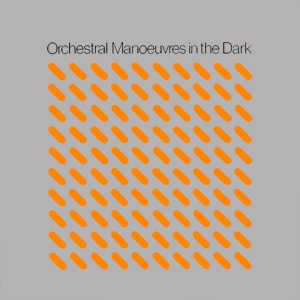
Orchestral Manoeuvres in the Dark is the debut studio album by English electronic band Orchestral Manoeuvres in the Dark (OMD), released on 22 February 1980 by Dindisc. Recorded at the group's Liverpool studio, it showcased their minimal synth-pop style and peaked at number 27 on the UK Albums Chart. "Electricity" and "Red Frame/White Light" were released as singles; a re-recorded version of "Messages" provided OMD with their first hit in the UK, reaching number 13.

Crush is the sixth studio album by English electronic band Orchestral Manoeuvres in the Dark (OMD), released on 17 June 1985 by Virgin Records. It is the first of two OMD studio albums to be produced by Stephen Hague. Aimed primarily at the US market, Crush is notable for moving the group towards a more polished sound, although elements of earlier experimentation are still present. During recording the band employed a greater use of organic instrumentation than in the past.

The Pacific Age is the seventh studio album by English electronic band Orchestral Manoeuvres in the Dark (OMD), released on 29 September 1986 by Virgin Records. It was the last of two OMD studio albums produced by Stephen Hague, after Crush (1985). The record exhibits the same refined production values as its predecessor while venturing into the realm of mid-1980s sophisti-pop, retreating further from the group's experimental beginnings.
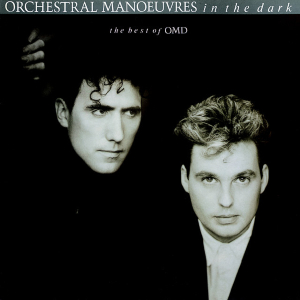
The Best of OMD is a compilation album by English electronic band Orchestral Manoeuvres in the Dark (OMD), released in 1988; marking a decade since the band's beginnings. The record essentially delineates the group's experimental early years from their pop-oriented later work: side one features recordings from 1979 to 1984, while side two is drawn from the group's 1984–1988 efforts.

"If You Leave" is a 1986 song by English electronic band Orchestral Manoeuvres in the Dark (OMD). It was recorded for the soundtrack to the film Pretty in Pink (1986), in which it is played prominently during the final scene. Along with 1980's "Enola Gay", the track has been described as OMD's signature song.
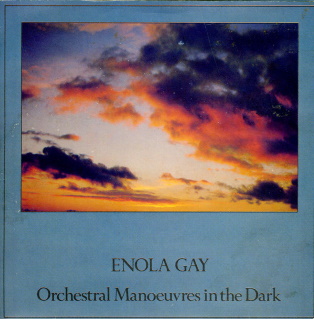
"Enola Gay" is an anti-war song by the English electronic band Orchestral Manoeuvres in the Dark (OMD), and the only single taken from their second studio album Organisation (1980). Written by lead vocalist and bass guitarist Andy McCluskey, it addresses the atomic bombing of Hiroshima by the aircraft Enola Gay on 6 August 1945, toward the conclusion of World War II. As is typical of early OMD singles, the song features a melodic synthesizer break instead of a sung chorus.
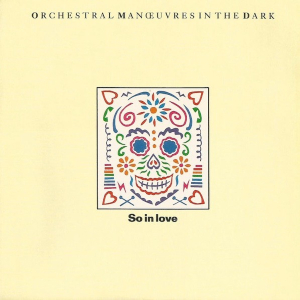
"So in Love" is a 1985 song by English electronic band Orchestral Manoeuvres in the Dark (OMD), released as the first single from their album Crush. It reached the top 30 of both the UK Singles Chart and the US Billboard Hot 100, becoming their first entry on the latter. The track was a top 10 hit in Belgium and Holland.

"Then You Turn Away" is a song by English electronic band Orchestral Manoeuvres in the Dark (OMD), released as the third single released from their eighth studio album, Sugar Tax (1991), on 2 September 1991. It peaked at number 50 on the UK Singles Chart the same month and also reached number 56 in Germany.

"Everyday" is a song by English electronic band Orchestral Manoeuvres in the Dark (OMD), released in 1993 as the third and final single from their ninth album, Liberator (1993). Co-founder Paul Humphreys, who had left the group four years prior, is credited as a co-writer. "Everyday" was the only single from Liberator to miss the UK top 25, charting at number 59. The accompanying music video features Sara Cox, who would later be known as a BBC Radio DJ.

"We Love You" is a 1986 song by English electronic band Orchestral Manoeuvres in the Dark (OMD), released as the second single from their album The Pacific Age. It was originally written for the film Playing for Keeps (1986).
"Brides of Frankenstein" is a medley of excerpts from various Orchestral Manoeuvres in the Dark (OMD) songs mixed with dance rhythms by Mike "Hitman" Wilson and Steve "Silk" Hurley.
David Alan Hughes is an English keyboardist who played in different new wave bands, and later became successful making music for films.

English Electric is the twelfth studio album by English electronic band Orchestral Manoeuvres in the Dark (OMD), and their second since the 2006 reformation of the group. Preceded by lead single "Metroland" on 25 March 2013, it was released on 5 April by 100% Records. Unlike predecessor History of Modern (2010), which was compiled remotely via the Internet, English Electric saw OMD co-founders Andy McCluskey and Paul Humphreys write and record in person, with the aim of recreating their artistic chemistry in years past. The album was largely inspired by McCluskey's then-recent divorce.
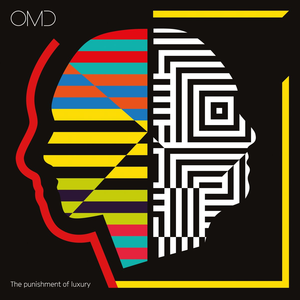
The Punishment of Luxury is the thirteenth studio album by English electronic band Orchestral Manoeuvres in the Dark (OMD), and the third since their 2006 reformation. Produced by OMD, it was released on 1 September 2017 by 100% Records in the UK and White Noise elsewhere. In July of that year, the band commenced a tour of North America and Europe in support of the record.

















